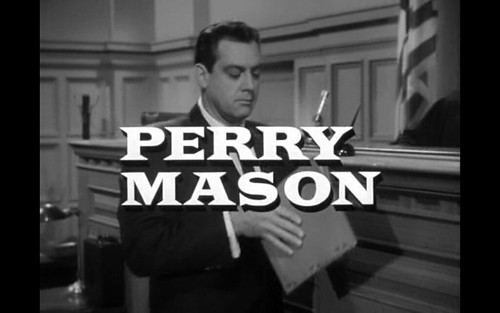 A "bar" too high? TV's lawyer Perry Mason.
A "bar" too high? TV's lawyer Perry Mason.
The American Bar Association is considering adding a rule to its canon of ethics that would prohibit lawyers from discriminating in the course of their jobs. The proposal seems innocuous and probably overdue -- but it has encountered a surprising degree of opposition. So it seems reasonable to ask: Why is this even a thing? How can anyone in good conscience think that barring discrimination by lawyers is a bad idea?
The answer is that the legal profession is the last bastion of unfettered, unapologetic nastiness, proudly flying the flag of zealous client representation. In some ways, that's good. The adversarial system calls for a degree of confrontation and aggression that would be inappropriate in almost any other professional context. Yet it should be possible to craft rules to carve out certain kinds of nastiness -- including discrimination on the basis of race, sex, sexual orientation, or other invidious motives.
An anecdote from my own workplace, where we train our students to think like lawyers, might help explain why the proposed ABA anti-discrimination rule has encountered resistance. A couple of years ago, in a workshop discussing classroom pedagogy and discrimination, a presenter -- not a faculty member -- introduced the topic of micro-aggressions.
The general idea was reasonable: Law professors, like everyone else, should be careful not to give offense by unintentionally deploying demeaning stereotypes.
But I felt the need to respond. I raised my hand and said that while unintentional micro-aggressions seemed worth avoiding, my job was to train my students for a career that involves channeling macro-aggression, both in the courtroom and in legal writing.
I wasn't trying to be flippant. Every day, lawyers have to confront other people and tell them that they are lying. Lawyers tell judges that the other side of the case is flatly wrong about the law as well as the facts. Even in negotiations that are nominally constructive and positive sum, lawyers support their clients' positions by trying to show that the other side has the wrong end of the stick.
You could sum this up by describing the American legal system as adversarial. And there is a core ethical principle that goes alongside the adversarial system. It's known as the ethical obligation of zealous advocacy.
It's so important that it's in the preamble to the ABA's model rules of professional conduct: "As advocate, a lawyer zealously asserts the client's position under the rules of the adversary system."
Once the principle of zealous advocacy is admitted, it raises a question: How zealous is too zealous? Lawyers are not supposed to lie in support of their clients, nor introduce false testimony. Lawyers are always officers of the court, and shouldn't make legal arguments that they know to be false.
But when it comes to manipulating the rules and shaping the context in which the truth is created, many lawyers think that zealous advocacy not only permits but also requires a certain degree of aggressiveness. That could include using the element of surprise in asking a question or introducing a motion. It could include taking advantage of an opponent's weaknesses.
To be sure, many legal ethics experts believe that zealous advocacy is completely consistent with rules of fair play, and would look askance at the tricks deployed by lawyers in the cut and thrust of practice. But I think it would be accurate to say that respect for the spirit of fairness in legal controversy is honored more in the breach.
So what about discrimination in the practice of law? We're not really talking here about refusing to hire a legal employee for discriminatory reasons. That's already prohibited by anti-discrimination law. We're talking about, for example, using a racist or sexist comment or phrase to put another lawyer or a witness off balance in the course of an adversarial proceeding.
Many lawyers don't want to be policed for discrimination in the course of doing their jobs. Some have noted that the ABA's proposed list of types of invidious discrimination is unusually inclusive: "race, sex, religion, national origin, ethnicity, disability, age, sexual orientation, gender identity, marital status or socioeconomic status." (The socioeconomic status element seems particularly tricky given lawyers' combination of class snobbery and desire to pick rich clients.)
But the real problem isn't the exhaustiveness of the list. It's lawyers' sense that they should be able to do anything within the law to give their clients a leg up.
And there's the answer to the problem. Lawyers, for better or worse, respect the fact that there are rules that set the outer bounds of permissible conduct. Sure, lawyers know better than anyone that rules are subject to interpretation and even manipulation. But they also know better than anyone that rules aren't completely empty.
The proposed ABA anti-discrimination rule will function to introduce a clear boundary to what lawyers may do on behalf of their clients. They will still be allowed to fight using the tools of the trade. But invidious discrimination will no longer be one of those permissible tools.
When you take away one of a warrior's weapons, the warrior never likes it much. But a good warrior will learn to fight under the new constraints. We want lawyers to be our warriors. But we don't need them to use every possible weapon -- especially when those weapons deserve our moral condemnation.
Comment by clicking here.
Noah Feldman, a Bloomberg View columnist, is a professor of constitutional and international law at Harvard University and the author of six books, most recently "Cool War: The Future of Global Competition."


 Contact The Editor
Contact The Editor
 Articles By This Author
Articles By This Author
